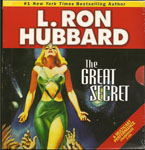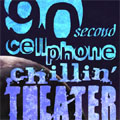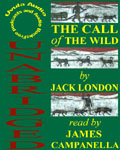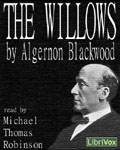
 The Great Secret
The Great Secret
By L. Ron Hubbard; Read by various
2 CDs – Approx. 2 Hours 20 Minutes [UNABRIDGED]
Publisher: Galaxy Press
Published: 2008
ISBN: 1592122493
Themes: / Science Fiction / Pulp / Spaceship / Navy / Venus / Slavery /
Fanner Marston was raised as a slave as a child, became a petty street thief as a teen, and now masters his own craft and crew as a grown man. He’s also gone completely mad. Driven by privation, with a vicious greed and slavering lust for power, Marston alone of forty men has survived the perilous trek through a blistering desert to the magical city of Parva, where legend says a secret awaits which will give him absolute control over the Universe. However, Marston finds the key to all power is not at all what he expected…”
Galaxy Press has given a deluxe treatment to these very pulpy pulp tales. The handsome cover art dates from 1949. Inside the package there is a 37 page, fully illustrated, booklet that includes a 6 page essay by Kevin J. Anderson and a 15 page biography of Hubbard. There are four stories included in this collection:
The Great Secret (Approx. 17 Minutes) – Narrated by Bruce Boxleitner, this is a fairly compelling, and quite strong story. The tale of an utterly driven man, searching for the alien tech rosetta stone that will make him the master of the universe. It could be interpreted as a Buddhist, Confucian or even Nietzschean parable. It also reminded me of the old “The Rip Van Winkle Caper” episode from the original Twilight Zone TV series. Boxleitner does good work.
Space Can (Approx. 35 Minutes) – A tale written in a bombastic puff that is so pulpy as to feel like it’s a pure pastiche. It’s the tale of a space navy ship “Menace” on patrol against superior aliens from Saturn. The action feels like a WWI-era naval battle, or earlier, complete with iron plated battleships, brstling with cannons, all pounding away at each other. There’s a lot in this short story, a breif setup, a few fights, a steely-eyed captain and crew, not to mention the fun sword-wielding ship boarding scenes. Space Can has multiple readers, though they only show up when the sparse dialogue appears.
3. The Beast (Approx. 43 Minutes) – On swampy Venus a mysterious Beast must be killed. Ginger Cranston, a “great white hunter” from Earth. Despite all the action this may be the most thoughtful tale in this collection, I quite liked where it went, though the getting there could have been a lot clearer. It’s almost like the movie Predator, except with an inversion of the alien and the man. Running water, grunts, and punching sounds all make the nifty action the narrator is giving out, hard to hear. It’s like a white noise, interfering with story.
4. The Slaver (Approx. 42 Minutes) – The weakest tale in this set, hardly memorable. Captured by slave traders, our hero, Kree Lorin the young hawk of Falcon’s Nest, outwits his captors, frees Dana, the “peasant girl of Palmerton” girl, and regains his spaceship. It’s got some very hokey dialogue and even hokier descriptions. I ended up not caring about it, and had to go back and listen again to recall any of the details.
Overall, the entire audiobook all feels over-produced. These Hubbard tales don’t really require multiple readers as they are very dialogue sparse. Also, the spartan use of sound effects and atmospheric sound doesn’t add anything substantial – in fact, in poor listening conditions, like while listening on the road, makes the varied voice types harder to hear. I can recommend The Beast and The Great Secret, these are solid pulp stories.
Posted by Jesse Willis

 Meatball Fulton’s podcast, Meatball’s Meatballs, will feature six stories from his series, 90 Second Cellphone Chillin’ Theatre starting on Friday October 10th 2008. In #17 |MP3| Fulton reveals how he came up with ideas for the 50 stories in this series, stories like Drooling Doreen, Ghouls Galore and Zombie Al’s Big Night Out. They are described as “humorous Hollywood influenced horror stories.”
Meatball Fulton’s podcast, Meatball’s Meatballs, will feature six stories from his series, 90 Second Cellphone Chillin’ Theatre starting on Friday October 10th 2008. In #17 |MP3| Fulton reveals how he came up with ideas for the 50 stories in this series, stories like Drooling Doreen, Ghouls Galore and Zombie Al’s Big Night Out. They are described as “humorous Hollywood influenced horror stories.”




 Run that by me one more time? Somebody over on LibriVox is reading my thoughts? Really?
Run that by me one more time? Somebody over on LibriVox is reading my thoughts? Really?

